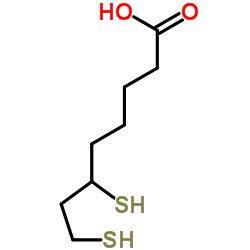α-Lipoic acid inhibits liver fibrosis through the attenuation of ROS-triggered signaling in hepatic stellate cells activated by PDGF and TGF-β.
Ning-Ping Foo, Shu-Huei Lin, Yu-Hsuan Lee, Ming-Jiuan Wu, Ying-Jan Wang
文献索引:Toxicology 282(1-2) , 39-46, (2011)
全文:HTML全文
摘要
Reactive oxygen species (ROS) have been implicated in hepatic stellate cell activation and liver fibrosis. We previously reported that α-lipoic acid (LA) and its reduced form dihydrolipoic acid (DHLA) inhibited toxicant-induced inflammation and ROS generation. In the present study, we further examined the effects of LA/DHLA on thioacetamide (TAA)-induced liver fibrosis in rats and the possible underlying mechanisms in hepatic stellate cells in vitro. We found that co-administration of LA to rats chronically treated with TAA inhibited the development of liver cirrhosis, as indicated by reductions in cirrhosis incidence, hepatic fibrosis, and AST/ALT activities. We also found that DHLA inhibited TGF-β/PDGF-stimulated HSC-T6 activation and ROS generation. These effects could be mediated by the MAPK and PI3K/Akt pathways. According to our current results, LA may have a beneficial role in the treatment of chronic liver diseases caused by ongoing hepatic damage.Copyright © 2011 Elsevier Ireland Ltd. All rights reserved.
相关化合物
| 结构式 | 名称/CAS号 | 分子式 | 全部文献 |
|---|---|---|---|
 |
二氢硫辛酸
CAS:462-20-4 |
C8H16O2S2 |
|
Wash-free magnetic immunoassay of the PSA cancer marker usin...
2016-03-21 [Lab Chip 16 , 1022-9, (2016)] |
|
Delivery and tracking of quantum dot peptide bioconjugates i...
2015-03-18 [ACS Chem. Neurosci. 6(3) , 494-504, (2015)] |
|
Colloidal stability of gold nanoparticles modified with thio...
2012-03-06 [Langmuir 28(9) , 4464-71, (2012)] |
|
Natural compound Alternol induces oxidative stress-dependent...
2014-06-01 [Mol. Cancer Ther. 13(6) , 1526-36, (2014)] |
|
Microwave-assisted rapid synthesis of luminescent gold nanoc...
2012-07-21 [Nanoscale 4(14) , 4155-60, (2012)] |